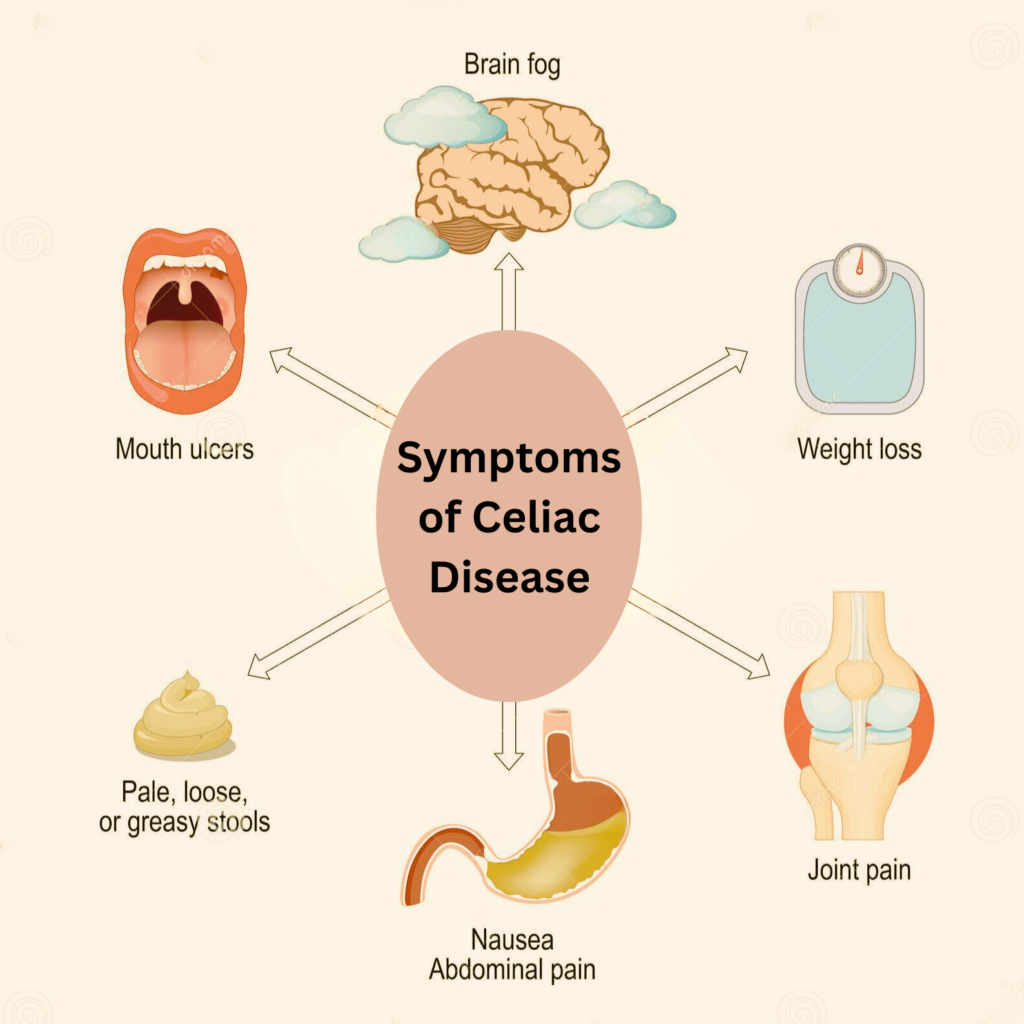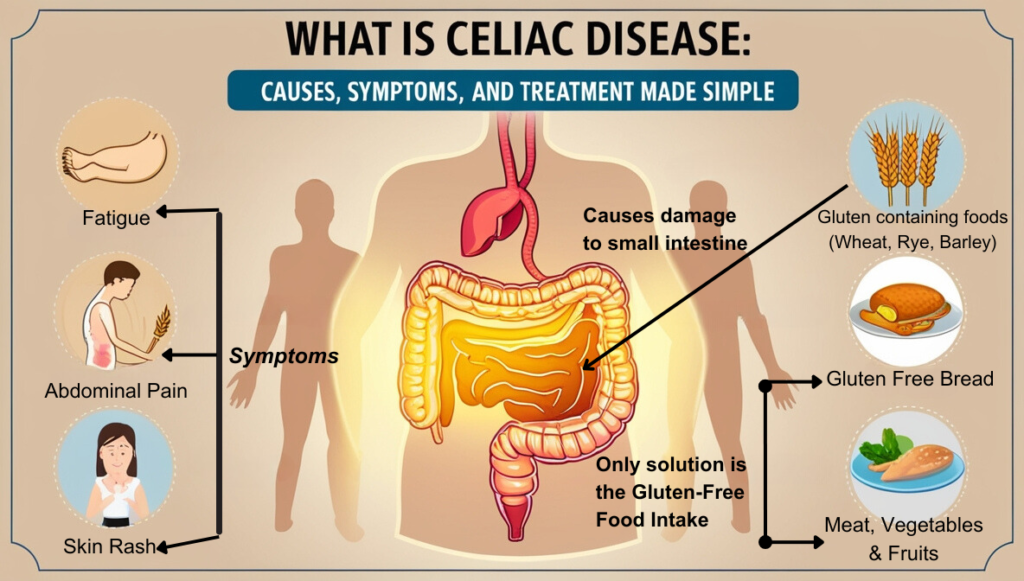Have you been experiencing digestive discomfort or unexplained health issues? It might be more than just a passing ailment. Celiac disease, a serious autoimmune disorder, could be the culprit. This blog post aims to shed light on celiac disease symptoms, offering valuable information to prospective patients, individuals with gluten sensitivity, health-conscious people, nutritionists, and gastroenterologists.
By understanding the signs and symptoms, you can take proactive steps towards better health and well-being.
In this comprehensive guide, we’ll explore the common and lesser-known symptoms of celiac disease as well, helping you recognize the warning signals your body might be sending.
What is Celiac Disease?
An Autoimmune Disorder
Celiac disease is an autoimmune disorder where the ingestion of gluten leads to damage in the small intestine. Gluten is a protein found in wheat, barley, and rye. For those with celiac disease, consuming gluten triggers an immune response that attacks the lining of the small intestine, leading to nutrient malabsorption.
Prevalence and Impact
It’s estimated that about 1 in 100 people worldwide have celiac disease, although many remain undiagnosed. The condition affects both children and adults, presenting a wide range of symptoms that can vary greatly from person to person. Understanding these symptoms is crucial for early diagnosis and effective management.
Why Awareness Matters?
Currently, there is no complete cure for celiac disease. However, with heightened awareness and early diagnosis, individuals can lead healthy and fulfilling lives. Timely identification of celiac disease is vital, as it can help avert complications such as malnutrition, anemia, osteoporosis, infertility, and an increased risk of certain cancers.
By raising awareness about the symptoms, we empower individuals to seek medical advice sooner, resulting in better health outcomes and an improved quality of life.
Thus, early detection and treatment are essential in preventing further damage to the body.
Digestive Symptoms of Celiac Disease

Chronic Diarrhea
One of the hallmark symptoms of celiac disease is chronic diarrhea. This persistent digestive issue occurs due to the body’s inability to absorb nutrients properly, leading to loose, watery stools. If you’ve been experiencing diarrhea for several weeks, it’s essential to consult a healthcare professional for evaluation.
Bloating and Gas
Frequent bloating and gas are common complaints among those with celiac disease. These symptoms result from the fermentation of undigested food in the intestine. While occasional bloating is normal, persistent discomfort could indicate an underlying issue like celiac disease.
Abdominal Pain
Many individuals with celiac disease report recurrent abdominal pain. This pain can range from mild to severe and is often accompanied by cramping.
If you experience unexplained stomach aches, consider discussing the possibility of celiac disease with your doctor.
Non-Digestive Symptoms of Celiac Disease
Fatigue and Weakness
Celiac disease often leads to fatigue and weakness due to poor nutrient absorption. When your body doesn’t get the vitamins and minerals it needs, it can affect your energy levels and overall vitality. Persistent fatigue despite adequate rest might be a sign of celiac disease.
Anemia
Anemia is another common non-digestive symptom of celiac disease.
Iron-deficiency anemia occurs when the damaged intestine can’t absorb enough iron from the diet. Symptoms include pale skin, shortness of breath, and dizziness. Iron supplements might not be effective if the underlying cause is undiagnosed celiac disease.
Joint Pain
Unexplained joint pain and arthritis-like symptoms can also be a sign of celiac disease. The inflammation caused by the immune response to gluten can affect various parts of the body, including the joints.
If you’re experiencing joint pain without a clear cause, consider gluten as a potential trigger.
Skin-Related Symptoms
Dermatitis Herpetiformis
Dermatitis Herpetiformis (DH) is a skin rash that affects about 10-15% of individuals with celiac disease. This intensely itchy, blistering rash typically appears on the elbows, knees, buttocks, and scalp.
Furthermore, it is a chronic condition that may continue to affect individuals despite following a gluten-free diet. Therefore, timely detection and intervention are vital for effectively managing DH.
Dry Skin
Celiac disease can also cause dry skin due to the lack of essential nutrients.
Vitamin deficiencies can lead to dryness, flakiness, and cracking of the skin. While other factors can contribute to dry skin, it’s worth considering celiac disease as a potential cause if it persists despite proper skincare.
Eczema and Psoriasis
Celiac disease can exacerbate existing skin conditions like eczema and psoriasis. The inflammation caused by gluten can worsen these conditions, leading to increased discomfort and flare-ups.
If you notice a correlation between gluten consumption and skin issues, it might be worth exploring further.
Hair Loss
Hair loss, or alopecia, can also be linked to celiac disease. Nutrient deficiencies caused by malabsorption can affect hair follicle health, leading to thinning hair or bald patches.
Addressing the underlying cause can help restore healthy hair growth.
Brittle nails
If you notice brittle, weak nails that break easily, it might be a sign to pay attention to. Don’t hesitate to explore any changes in your nails, as it’s important to look into potential underlying causes. Your health matters.

Neurological Symptoms
Did you know that some individuals with celiac disease can experience surprising neurological symptoms?
Here are a few to watch out for:
Migraines and Headaches
Research has shown a link between celiac disease and migraines or recurrent headaches. Inflammation and immune responses triggered by gluten can contribute to these types of headaches, making them more frequent and severe.
Peripheral Neuropathy
Celiac disease can damage the nerves in the extremities, leading to numbness, tingling, or weakness. This condition is known as peripheral neuropathy and can cause difficulties with coordination and balance.
While it’s possible to manage these symptoms, early detection can help prevent long-term damage.
Depression and Anxiety
Anxiety and depression are common among those with autoimmune disorders like celiac disease. The link between gut health and mental well-being is well-documented, and celiac disease can profoundly affect both aspects.
Studies suggest that nutrient deficiencies caused by celiac disease may contribute to changes in mood and behavior. Proper diagnosis and management of celiac disease can help improve overall mental wellness and quality of life.
Seizures
In rare cases, untreated celiac disease can lead to seizures or epilepsy. While the exact mechanism is unclear, research suggests a connection between gluten sensitivity and seizures in some individuals.
If you experience unexplained seizures, consider discussing the potential link to celiac disease with your doctor.
Cognitive Impairment
Some individuals with celiac disease experience cognitive impairment, often referred to as “brain fog.” This includes difficulties with concentration, memory, and mental clarity.
If you find yourself struggling with cognitive tasks, gluten might be affecting your brain function.
Emotional and Psychological Symptoms
Emotional and psychological symptoms are often overlooked as potential signs of celiac disease. However, research has shown a significant link between celiac disease and conditions like depression and anxiety.
Irritability
Individuals with undiagnosed celiac disease may experience irritability or mood swings due to inflammation in the gut. This can lead to changes in behavior and make it challenging to manage stress effectively.
Difficulty Coping with Stress
Coping with chronic illness can be stressful, but studies have shown that individuals with celiac disease may have a more difficult time managing stress compared to those without the condition. Proper management of celiac disease can help improve overall emotional well-being and resilience.
Mood Swings
Mood swings and irritability are frequently observed in individuals with celiac disease. The link between gut health and mental well-being underscores the necessity of addressing gluten-related concerns.
By adopting a gluten-free diet, one can enhance gut health, ultimately fostering greater emotional stability.
Behavioral Changes in Children
Children with celiac disease may experience behavioral changes due to malabsorption of essential nutrients. This can include hyperactivity, irritability, and even difficulty focusing in school.
If your child is showing sudden changes in behavior, it may be important to explore a potential connection to celiac disease and seek appropriate diagnosis and treatment.
Reproductive Health Symptoms
Celiac disease can cause chronic inflammation and nutrient malabsorption. These disruptions can lead to hormonal imbalances, fertility challenges, and complications during pregnancy. Recognizing and addressing these symptoms early is crucial for improving reproductive outcomes and overall well-being.
Infertility
Celiac disease can impact reproductive health, leading to infertility in both men and women. The inflammation and nutrient deficiencies associated with the condition can affect hormonal balance and fertility.
Addressing celiac disease can improve reproductive outcomes.
Miscarriage
Women with untreated celiac disease might experience a higher risk of miscarriage. The body’s immune response and nutrient deficiencies can affect pregnancy outcomes. Early diagnosis and a gluten-free diet can help reduce this risk.
Menstrual Irregularities
Menstrual irregularities, such as missed periods or heavy bleeding, can be linked to celiac disease. The disruption in hormone levels caused by nutrient deficiencies can affect the menstrual cycle.
A balanced gluten free diet can help regulate hormone levels and improve overall reproductive health.
Dental Symptoms
Celiac disease can affect oral health, leading to various dental issues caused by nutrient deficiencies and immune responses. They may include:
Enamel Defects
Enamel defects, such as discoloration and pitting, are common in individuals with celiac disease. These defects can make teeth more susceptible to decay. Proper oral hygiene and addressing the underlying cause can help maintain dental health.
Canker Sores
Frequent canker sores can be a sign of celiac disease. These painful mouth ulcers can be triggered by the body’s immune response to gluten. A gluten-free diet can help reduce the occurrence of canker sores.
Dry Mouth
Dry mouth, or xerostomia, can also be associated with celiac disease. This condition can increase the risk of dental issues and discomfort. Staying hydrated and addressing the root cause can alleviate dry mouth symptoms.
Nutritional Deficiencies
Nutritional deficiencies are a common symptom of celiac disease. When the small intestine is damaged, it can affect the absorption of essential nutrients, leading to deficiencies that can have various effects on the body.
Iron Deficiency Anemia
Celiac disease can lead to malabsorption of iron, resulting in iron deficiency anemia. This condition can cause fatigue, weakness, and shortness of breath.
If you’re experiencing these symptoms alongside gastrointestinal issues, consider getting tested for celiac disease.
Vitamin D Deficiency
Since vitamin D plays a crucial role in maintaining healthy bones and immune function, individuals with celiac disease are at a higher risk for developing vitamin D deficiency.
This deficiency can contribute to osteoporosis and increase the likelihood of developing other autoimmune disorders.
Calcium Deficiency
Calcium is essential for maintaining healthy bones, and celiac disease can hinder its absorption. Prolonged calcium deficiency can lead to weak, brittle bones, and increase the risk of fractures.
If you have celiac disease, it is crucial to monitor your calcium levels and consider supplementation if needed.
Vitamin B12 Deficiency
Vitamin B12 deficiency is common in individuals with celiac disease. This vitamin is crucial for nerve function and red blood cell production. Symptoms of deficiency include fatigue, weakness, and neurological issues. B12 supplements might be necessary to address this deficiency.
Folate Deficiency
Folate deficiency can result in anemia and other health issues. Since folate is essential for DNA synthesis and cell division, its deficiency can affect overall health. Including folate-rich foods and supplements can help mitigate this deficiency.
Recognizing Symptoms in Infants and Toddlers
Celiac disease can manifest differently in infants and toddlers compared to adults. Common symptoms to watch for include failure to thrive, chronic diarrhea, and increased irritability. If you suspect your child may have celiac disease, it’s crucial to consult a pediatrician for an accurate diagnosis and appropriate treatment.
Failure to Thrive
Infants and toddlers with celiac disease might experience failure to thrive, characterized by poor weight gain and growth. Identifying this symptom early can lead to timely intervention and improved health outcomes.
Chronic Diarrhea
Chronic diarrhea in young children can be a sign of celiac disease. If your child experiences persistent digestive issues, it’s important to seek medical advice. Early diagnosis and a gluten-free diet can help manage these symptoms.
Irritability in Toddlers
Irritability and fussiness in infants and toddlers may be associated with celiac disease. Digestive discomfort can significantly impact their mood and behavior. If your child seems excessively irritable, consider consulting a doctor to rule out potential underlying health issues.
By addressing the root cause, caregivers can help foster a happier and healthier child.
Challenges in Diagnosing Celiac Disease
Diagnosing celiac disease can be challenging due to its wide range of symptoms and the lack of universal diagnostic tests. Additionally, many individuals may not experience any noticeable symptoms, making it even more difficult to detect.
If you suspect you or your child may have celiac disease, consult with a healthcare professional for accurate testing and diagnosis.
Symptom Variability
Diagnosing celiac disease can be challenging due to the variability of symptoms. Some individuals might present with classic digestive symptoms, while others have non-digestive or even asymptomatic forms of the disease.
This variability highlights the importance of comprehensive testing and evaluation.
Overlapping Conditions
Celiac disease symptoms can overlap with other conditions, such as irritable bowel syndrome (IBS) and lactose intolerance. Differentiating between these conditions requires thorough medical assessment and diagnostic tests.
Working with a healthcare professional is crucial for accurate diagnosis.
Importance of Testing
Testing for celiac disease generally includes blood tests to identify specific antibodies, followed by a biopsy of the small intestine for confirmation. It is crucial to undergo testing prior to initiating a gluten-free diet, as eliminating gluten can influence test outcomes. For an accurate diagnosis, consulting a gastroenterologist is essential.
Conclusion
Recognizing the symptoms of celiac disease is essential for your health. These symptoms can vary from digestive issues to neurological problems, making it crucial to remain vigilant. If you suspect you may have celiac disease, do not delay—consult a healthcare professional and undergo testing for an early diagnosis.
Adopting a strict gluten-free diet can help you avoid complications and significantly improve your quality of life. It is advisable to seek guidance from a specialist for personalized support. Stay informed and take control of your health to lead a fulfilling life free from the challenges of celiac disease.



